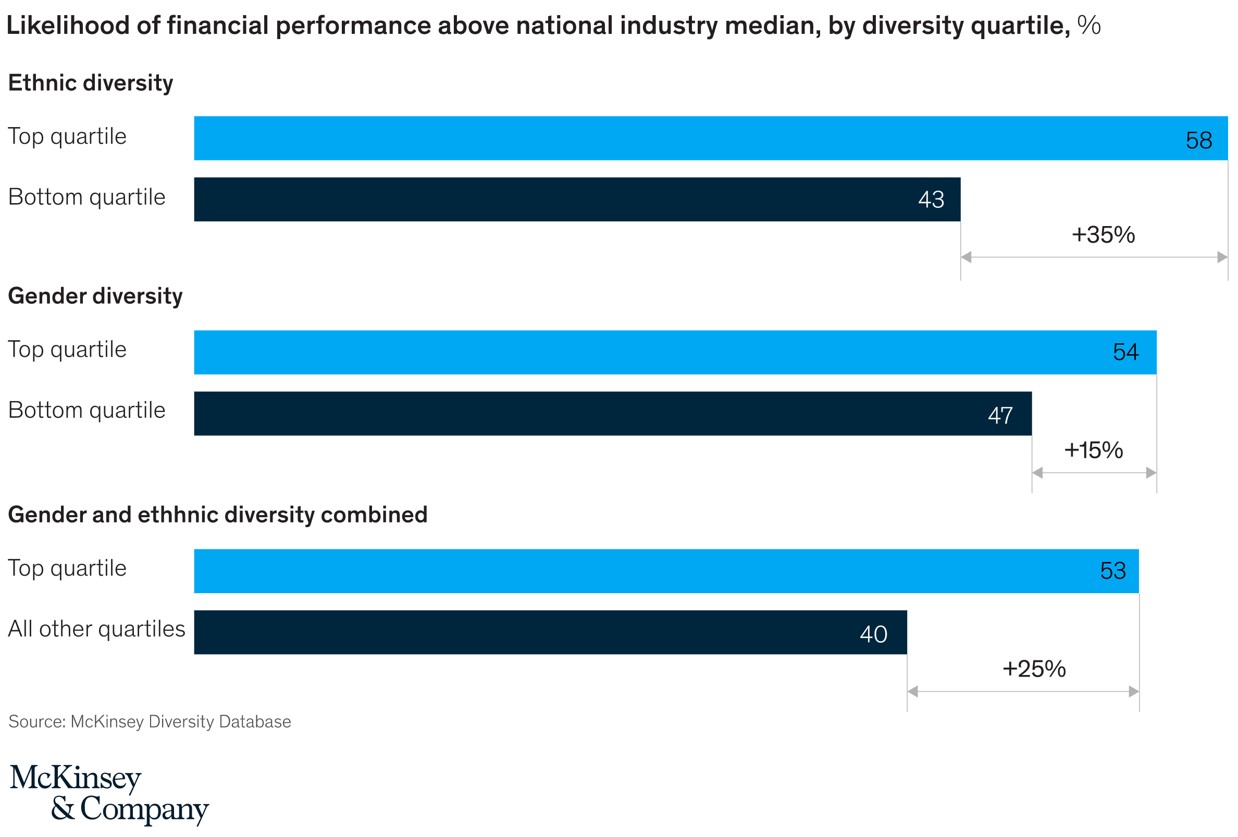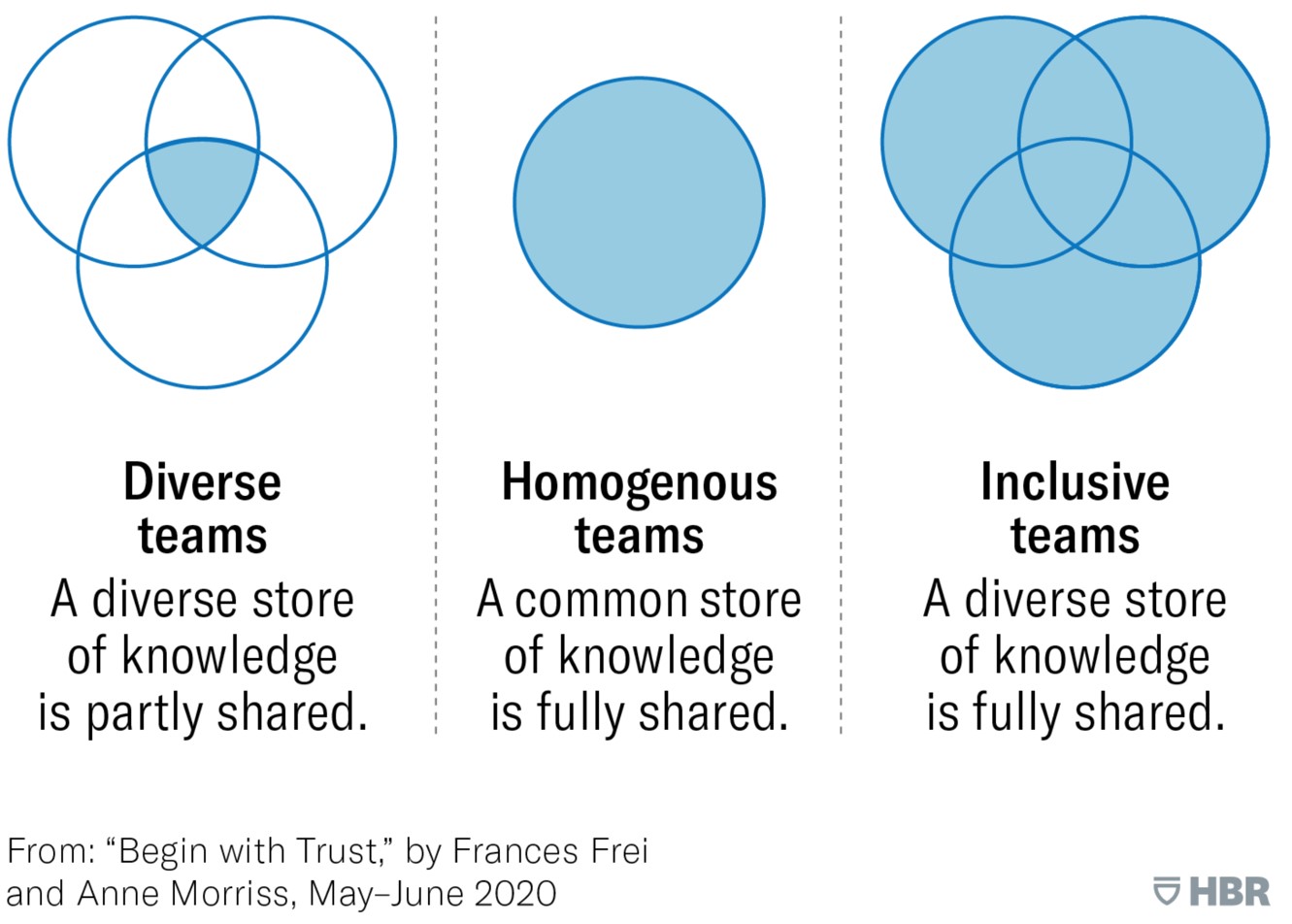
Diversity matters for the success of your business. As McKinsey has shown in their research, diversity correlates with better financial performance:

The concept of “mutual information and knowledge” is central to understanding the positive impact of diversity. Sinan Aral (NYU Stern School of Business & MIT), Erik Brynjolfsson (MIT Sloan School of Management) and Marshall Van Alstyne (Boston University & MIT) explain this well:
- While teams who share significant amounts of mutual information and knowledge may be more harmonious and better able to communicate and coordinate effectively, knowledge homogeneity can reduce learning, creative problem solving and performance
- In contrast, more diverse teams can apply broader, more novel expertise, making it possible for “diversity to trump ability“. Teams with less expertise but more diversity can outperform teams with more expertise but less diversity.
HBR notes that diversity advantage isn’t automatic. The uncomfortable truth is that diverse teams can underperform homogenous teams if they’re not managed actively for differences among members. But if you create conditions that allow team members to bring their unique perspectives and experiences to the table, you can create an unbeatable advantage.

What are the implications for teams?
Diverse teams need inclusive environment to realize their full potential. Team leaders should ask themselves: “Am I maximizing the effects of diversity on our outcomes? Are my team members comfortable being authentic and sharing their unique points of view? Are differences in opinions perceived as a positive attribute of our team?” Leaders have an opportunity to leverage virtual experiences to help team members deeply connect with each other and learn the value of novel perspectives.

Diversity matters for the success of your business. As McKinsey has shown in their research, diversity correlates with better financial performance:

The concept of “mutual information and knowledge” is central to understanding the positive impact of diversity. Sinan Aral (NYU Stern School of Business & MIT), Erik Brynjolfsson (MIT Sloan School of Management) and Marshall Van Alstyne (Boston University & MIT) explain this well:
- While teams who share significant amounts of mutual information and knowledge may be more harmonious and better able to communicate and coordinate effectively, knowledge homogeneity can reduce learning, creative problem solving and performance
- In contrast, more diverse teams can apply broader, more novel expertise, making it possible for “diversity to trump ability“. Teams with less expertise but more diversity can outperform teams with more expertise but less diversity.
HBR notes that diversity advantage isn’t automatic. The uncomfortable truth is that diverse teams can underperform homogenous teams if they’re not managed actively for differences among members. But if you create conditions that allow team members to bring their unique perspectives and experiences to the table, you can create an unbeatable advantage.

What are the implications for teams?
Diverse teams need inclusive environment to realize their full potential. Team leaders should ask themselves: “Am I maximizing the effects of diversity on our outcomes? Are my team members comfortable being authentic and sharing their unique points of view? Are differences in opinions perceived as a positive attribute of our team?” Leaders have an opportunity to leverage virtual experiences to help team members deeply connect with each other and learn the value of novel perspectives.

Test H2
Test H3
Shelter-in-place and social distancing guidelines have changed the way B2B selling works. Field sales teams have moved inside for the foreseeable future. Most of their interactions with customers are now virtual. Many B2B sellers assume that inability to use traditional strategies such as onsite meetings and customer dinners has negatively impacted their sales process. However, we believe that this time presents a unique opportunity to learn new ways to cultivate relationships virtually and realize the full productivity potential of B2B virtual selling.
Tomasz Tunguz from Redpoint explored the unforeseen benefits of virtual channels for marketing teams and shared his findings in an article. Tomasz looked at the portfolio companies’ experiences with virtual events and observed four things:
(1) 5-10x More Attendees
Virtual events amplify both registrants and attendees by similar multiples. The number of attendees increases by a factor of 5-10x compared to an IRL event.
(2) Easier Execution, Shorter Cycle Time
Because virtual events liberate attendees and organizers from logistics, they can be executed on short notice. Provoked by the right content, audiences will register for an event two or three weeks out. With shorter cycle times between events, marketing teams can accelerate their cadence, learn quicker, and engage more of their ecosystem
(3) Viable Lead Generation Channel
For marketing teams, this is a new muscle to flex, but the immediate impact to lead generation has evinced them virtual events are the future.
(4) New and Valuable Granular Behavior Data
With virtual events, marketing teams can capture more granular data about the behavior of attendees than IRL events. Which vendors did attendees visit? How long did they tarry? Which talks did each person attend?
Is there a way for B2B sellers to leverage virtual experiences with similar success to advance sales cycles? In our experience, the answer to this question is “Yes,” and there is a real opportunity to leverage similar strategies at the later stages of the sales and marketing funnel.
What are the implications for B2B Sales teams?
B2B sellers can cultivate relationships by inviting customers to shared virtual experiences. This approach will help to (1) have additional informal interactions with the stakeholders; (2) engage more members of a buying committee; (3) better understand the strength of your connection; (4) learn more about people and develop trust; (5) differentiate from the competition.

Test H2
Test H3
Shelter-in-place and social distancing guidelines have changed the way B2B selling works. Field sales teams have moved inside for the foreseeable future. Most of their interactions with customers are now virtual. Many B2B sellers assume that inability to use traditional strategies such as onsite meetings and customer dinners has negatively impacted their sales process. However, we believe that this time presents a unique opportunity to learn new ways to cultivate relationships virtually and realize the full productivity potential of B2B virtual selling.
Tomasz Tunguz from Redpoint explored the unforeseen benefits of virtual channels for marketing teams and shared his findings in an article. Tomasz looked at the portfolio companies’ experiences with virtual events and observed four things:
(1) 5-10x More Attendees
Virtual events amplify both registrants and attendees by similar multiples. The number of attendees increases by a factor of 5-10x compared to an IRL event.
(2) Easier Execution, Shorter Cycle Time
Because virtual events liberate attendees and organizers from logistics, they can be executed on short notice. Provoked by the right content, audiences will register for an event two or three weeks out. With shorter cycle times between events, marketing teams can accelerate their cadence, learn quicker, and engage more of their ecosystem
(3) Viable Lead Generation Channel
For marketing teams, this is a new muscle to flex, but the immediate impact to lead generation has evinced them virtual events are the future.
(4) New and Valuable Granular Behavior Data
With virtual events, marketing teams can capture more granular data about the behavior of attendees than IRL events. Which vendors did attendees visit? How long did they tarry? Which talks did each person attend?
Is there a way for B2B sellers to leverage virtual experiences with similar success to advance sales cycles? In our experience, the answer to this question is “Yes,” and there is a real opportunity to leverage similar strategies at the later stages of the sales and marketing funnel.
What are the implications for B2B Sales teams?
B2B sellers can cultivate relationships by inviting customers to shared virtual experiences. This approach will help to (1) have additional informal interactions with the stakeholders; (2) engage more members of a buying committee; (3) better understand the strength of your connection; (4) learn more about people and develop trust; (5) differentiate from the competition.

Diversity matters for the success of your business. As McKinsey has shown in their research, diversity correlates with better financial performance:

The concept of “mutual information and knowledge” is central to understanding the positive impact of diversity. Sinan Aral (NYU Stern School of Business & MIT), Erik Brynjolfsson (MIT Sloan School of Management) and Marshall Van Alstyne (Boston University & MIT) explain this well:
- While teams who share significant amounts of mutual information and knowledge may be more harmonious and better able to communicate and coordinate effectively, knowledge homogeneity can reduce learning, creative problem solving and performance
- In contrast, more diverse teams can apply broader, more novel expertise, making it possible for “diversity to trump ability“. Teams with less expertise but more diversity can outperform teams with more expertise but less diversity.
HBR notes that diversity advantage isn’t automatic. The uncomfortable truth is that diverse teams can underperform homogenous teams if they’re not managed actively for differences among members. But if you create conditions that allow team members to bring their unique perspectives and experiences to the table, you can create an unbeatable advantage.

What are the implications for teams?
Diverse teams need inclusive environment to realize their full potential. Team leaders should ask themselves: “Am I maximizing the effects of diversity on our outcomes? Are my team members comfortable being authentic and sharing their unique points of view? Are differences in opinions perceived as a positive attribute of our team?” Leaders have an opportunity to leverage virtual experiences to help team members deeply connect with each other and learn the value of novel perspectives.

COVID-19 pandemic caused a major transition to remote work. Teams and companies had to come together to form new norms and learn to collaborate in new ways. B2B sales teams are facing an additional challenge in this new remote environment.
In addition to maintaining productivity when working with their colleagues, B2B sellers must build and develop business connections and progress their sales cycles with potential customers. The approaches that worked well in the past – such as onsite visits, business lunches and dinners, conferences – can not be applied anymore. Many sales leaders believe that their teams’ ability to make customer connections, develop trust, have casual and open conversations with their customers has been significantly impaired.
While B2B sales leaders have their concerns, can virtual B2B selling be a viable long-term model? BAIN & COMPANY believes that virtual B2B selling is here to stay as it offers several meaningful advantages such as greater effectiveness, improved customer experience, higher sales productivity, and reduced cost.
A recent BAIN & COMPANY survey, powered by Dynata, of more than 300 B2B buyers and sellers helps dispel some common misconceptions about virtual B2B selling:
- 50% of sales interactions were virtual even before the pandemic due to faster communication and cost-effectiveness
- 75% of buyers and 54% of sellers agreed or were neutral that virtual is as effective for complex products
- 35% of respondents have bought or sold products priced over $500,000 virtually
- 80% of buyers and sellers believe there will be a sustained increase in virtual interactions
While these findings are encouraging, many questions remain open. How to engage and provide differentiated virtual experience to a potential customer? How to build trust in the remote environment? How to help customers get more comfortable making a big decision without meeting their vendor in-person?
What are the implications for B2B Sales teams?
B2B sellers must adapt old strategies and learn to nurture relationships virtually. We recommend using shared virtual experiences as an effective approach for strengthening connections and trust with the customers in the new remote environment.





